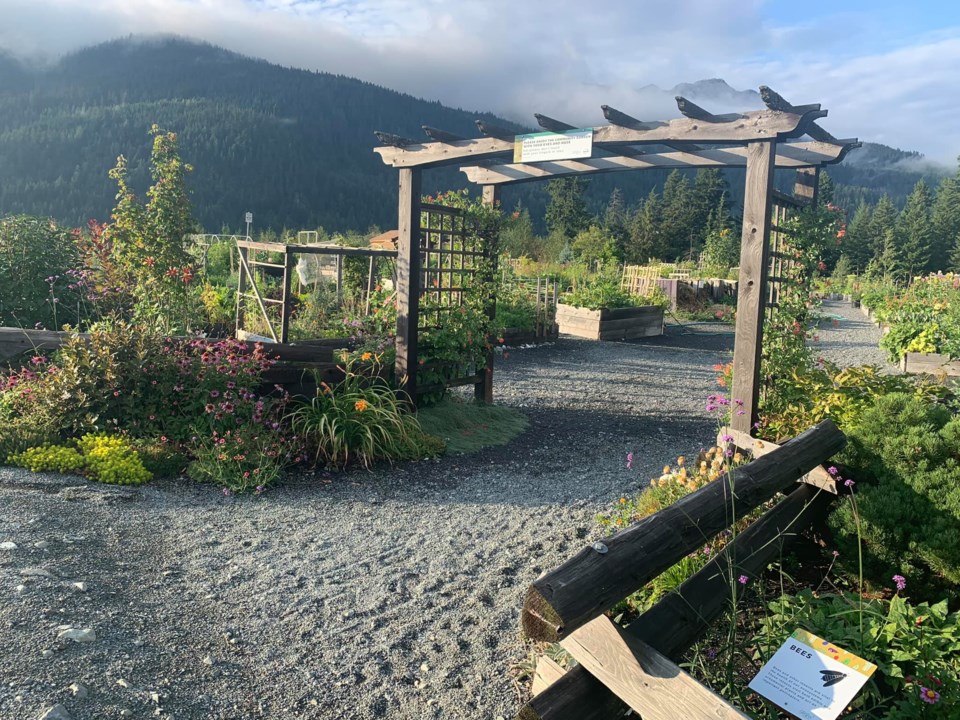Every week, Whistler Councillor Jen Ford gets more than a dozen zucchinis from the Cheakamus Community Garden, one of four garden and greenhouse sites around town operated by the Association of Whistler Area Residents for the Environment (AWARE).
“That’s too many zucchinis,” she joked at Tuesday, July 18’s Committee of the Whole presentation, at which Whistler’s environmental non-profit presented to elected officials. “Don’t leave your car unlocked because I’ll leave a zucchini on your front seat.”
This abundance of locally grown produce is a tangible representation of how far AWARE’s GROW program has come over the years. Since AWARE took over in 2017 from the Whistler Community Services Society, the program has seen more than 400 locals grow their own organic veggies in more than 220 garden boxes, reducing carbon footprints and the amount of packaging required by growing food close to home.
Despite its popularity, the GROW program, historically, has barely broke even for the organization, with its relatively high overhead.
“For a non-profit to run [a program] at a loss tells you how important it is for us,” said AWARE president Paul Dorland. “But it also tells you, how long can non-profits run great programs in the community of Whistler at a loss? It’s a challenge.”
That challenge speaks to a wider consideration at AWARE, as the organization gets set to undertake a thorough strategic review. One of the persistent factors hampering the organization is the uncertainty it has around program funding. Currently, the Resort Municipality of Whistler (RMOW) supports the GROW program through the use of the land, and some in-kind services.
“You should know that we won’t be able to run GROW next year; we can’t afford to,” Dorland continued. “So, what are the options?”
Dorland mentioned the possibility of another non-profit taking over the gardens, although he noted there wasn’t an obvious candidate locally. The municipality could run the program, as local governments do with similar programs across B.C., or, Dorland suggested, AWARE could continue at the reins and scale up the program—with dedicated municipal funding. AWARE estimates there is capacity to double or even triple the program’s scope.
“On our end, scaling up could be really helpful. Obviously [Cheakamus Crossing] is slated for more units to go in, more condos, and we’ve added 40 boxes into a space that was 150 previously, even in the last few years, and our waitlist is still at 50 people,” said AWARE executive director Claire Ruddy. “I think it’s a build-it-and-they-will-come scenario in that program.”
The GROW program is, in some ways, a microcosm of the funding uncertainty AWARE deals with every budget season, something the board of directors is eager to change. In recent years, the organization’s annual revenues have hovered around the $300,000 mark—roughly $325,000 in 2022—with nearly half of that made up of government and non-government grants. According to Ruddy, however, AWARE has “kind of reached a cap for long grants from non-government sources.” Now, the organization is calling on the RMOW to consider a more secure, predictable funding base for the non-profit.
“We go into every year without a single dollar of secured funding,” Ruddy said. “We’re really looking at new ways to partner … and moving forward in ways that increase our security as an organization and our ability to deliver climate projects by focusing on multi-year program delivery and timescales.”
In response, Mayor Jack Crompton said the municipality and AWARE’s priorities “very much align,” particularly on climate action, but he stopped short of committing to multi-year funding for the non-profit.
“Council has prioritized climate and AWARE is actively engaged in that work. It’ll be work I expect our team to do with AWARE to understand how we best address those shared challenges. It may be multi-year plans—but that’s a decision that’s in our future,” he said.
No plans for Bayly Park just yet
With the BMX track in Cheakamus Crossing being decommissioned this year, there has been some speculation in the neighbourhood over what that means for Bayly Park, including rumours about the relocation of the GROW community garden.
According to the RMOW, engagement and planning for Bayly’s long-term future is still a long ways off.
“There are no plans to change anything now,” said Crompton, adding that public engagement likely won’t happen until 2025 at the earliest.
Plans for the Whistler BMX Track will likely be considered on a shorter timeline, however.
“If the BMX track is going to be unused, we may have to put some planning to it [sooner],” Crompton added.




